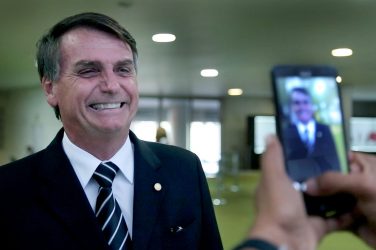Venezuela has initiated steps to expel two top diplomats. The envoys from Brazil and Canada are accused of interfering in the country’s politics by criticizing President Maduro’s socialist government.
The head of Venezuela’s constitutional assembly, Delcy Rodriguez, said that Brazil’s ambassador Ruy Pereira and Canadian charge d’affaires Craig Kowalik were no longer welcome in Venezuela.
“We have decided to declare persona non grata the Brazilian ambassador until such time as constitutional order is restored in the neighboring country” Rodriguez said, referring to the government of Brazilian President Michel Temer, whose name is implicated in a major corruption affair.
Meanwhile Rodriguez went on to accuse Canadian diplomat Craig Kowalik of “constant rude and offensive interference in Venezuela’s domestic affairs.”
Declaring the diplomatic envoys persona non grata automatically implies the removal of their diplomatic credentials.
Tit for Tat Diplomacy
Brazil’s Ministry of Foreign Affairs indicated that if its ambassador was indeed expelled it would respond in equal measure, adding that the government had not received any official notification from Venezuela yet.
“If confirmed, this decision demonstrates, once again, the authoritarian nature of the Nicolas Maduro administration and its lack of willingness to engage in any type of dialogue,” Brazilian officials told the Associated Press.
Canadian officials meanwhile said in a statement that they had met with the UN Secretary General and international partners to discuss a strategy for restoring order in Venezuela.
“Canadians will not stand by silently as the Government of Venezuela robs its people of their fundamental democratic and human rights, and denies them access to basic humanitarian needs,” Global Affairs Canada spokeswoman Natasha Nystrom told the Associated Press.
Growing Isolation
Officials from several countries, including Brazil and Canada, have been increasingly critical of Venezuelan President Nicolas Maduro’s government.
Venezuela drew particular condemnation from the international community earlier in December when its pro-government constitutional assembly blocking three of the country’s most influential opposition parties from participating in next year’s presidential election.
The international community has accused Maduro of consolidating power and isolating the country’s opposition parties, as evidence of torture and violence against dissidents continues to amass.
Venezuela drew international condemnation on Wednesday when its pro-government constitutional assembly effectively stripped three of the country’s most influential opposition parties of the right to participate in next year’s presidential election.
It followed a threat by Maduro to punish the opposition groups for boycotting recent mayoral elections, protesting what they considered an unfair, rigged system run by a dictatorship.
The constituent assembly passed a decree requiring the parties to reapply for legal status. It comes ahead of presidential elections next year when Maduro is expected to seek a second term.
Rodriguez targeted Brazil’s ambassador, Ruy Pereira, and Canada’s charge d’affaires, Craig Kowalik. She accused Kowalik for a history of tweeting “rude and vulgar” comments about Venezuela.
Canadian officials said in a statement that they have met with the United Nations Secretary General and the country’s international partners to discuss a strategy for restoring order in Venezuela.
The move to send home the two diplomats comes shortly after the government sparred with U.S. envoy Todd Robinson, who arrived days before Venezuela’s measure blocking the opposition parties.
The U.S. Embassy in Caracas strongly rebuked the assembly’s latest decree.
“The Venezuelan government and its illegitimate National Constituent Assembly are inventing rules as they go,” the embassy said in a tweet. “This is not democracy. Differing political views make strong democracies.”
dw/MP





